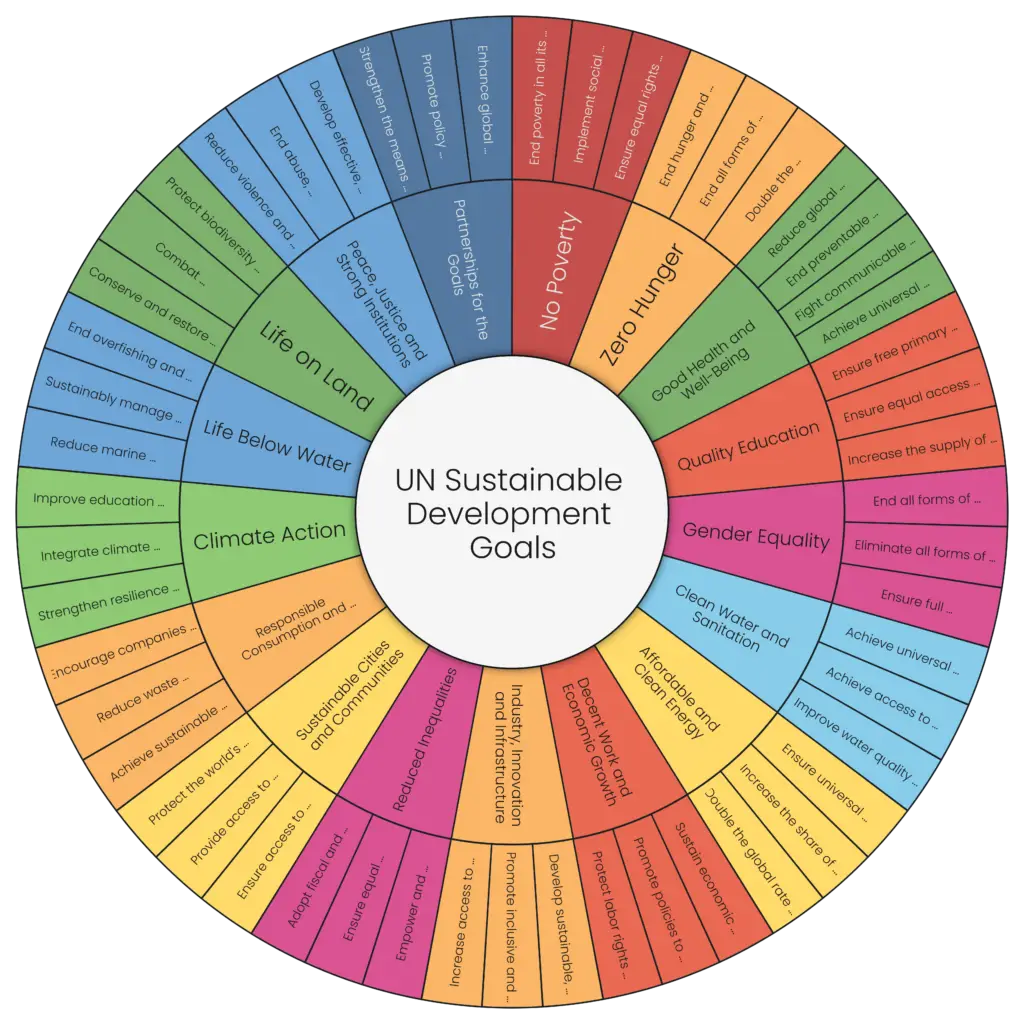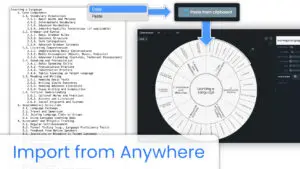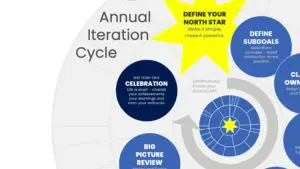Set Personal Goals to Help Achieve the UN’s Sustainable Development Goals.
Introduction
In a nutshell this article is about how we can all get off our collective butt and do something to help other people, other species and the planet we all share.
Sorry if this is a bit preachy but time is short, so no point beating about the bush. The thing is: it’s time to act – now!
First a bit about the United Nations’ Sustainable Development Goals (SDGs).
What are they?
The UN SDGs are a set of goals to end poverty, protect the planet, and ensure that all people enjoy peace and prosperity by 2030. A bit idealistic, right? I get it, but nothing wrong with that, seems like a solid deal to me.
How many goals are there?
There are 17 in total (see below). Quite a stretch for any of us to cover all bases, but every little helps as the saying goes.
How can I personally help achieve them?
So, to the crux of the matter. Can we, as mere individuals, make any real difference in helping to achieve these goals?
Simply put – the answer is a resounding YES. And we’ve created Goalscape template to help. But read on first…
While it might seem insignificant, diligently separating your household waste into brown and green bins, turning the thermostat or air con down and not running the tap at full blast as you brush your teeth, all have a massively positive aggregate effect.
Take using less water to brush your teeth.
On average a person uses about 2 gallons of water per min if the tap is left running. Assuming it takes about 2 mins to brush your teeth, that saves about 4 gallons of water. Brushing 2x per day saves @ 8 gallons.
Over a year that’s about 2,900 wasted gallons of water per person.
Now if roughly half the global population (3.9 billion according to the World Bank) is currently wasting 8 gallons per day, we could save roughly 30 billion gallons per day, which amounts to a staggering 11 trillion gallons a year (give or take a few galls here and there)
To put that in context, the World Health Organization estimates that each person needs around 9.25 gallons per day to meet their basic needs for drinking, cooking and hygiene.
That’s not much more than you and I are wasting while brushing our teeth twice a day!
And with about 2 billion people living in countries suffering high water stress and shortage, our efforts can have a massive effect.
Sure, cutting the splash we make when scrubbing our gnashers can’t directly fix shortages in drought hit countries, however it can help indirectly by:
- Lowering pressure on freshwater systems and making more water available for redistribution
- Decreasing the burden on water infrastructure, allowing for better management and investment in water transportation and shortage solutions
- Cutting the impact of climate change and population growth.
Not bad eh when you look at it like that!
Oh and by the way, ‘Clean Water and Sanitation’ is SDG 6.
Okay so what are the 17 Global Goals, and how can we all help?

1: No Poverty – Eradicate poverty in all its forms everywhere.
Things you can do:
- Find a Poverty charity you want to support and donate your time or money.
- Donate what you don’t use. Local charities will give your gently used clothes, books and furniture a new life.
- Support campaigns collecting items for victims of emergencies. Donate blankets, food supplies, etc. to support those in need.
2: Zero Hunger – End hunger, achieve food security and improved nutrition, and promote sustainable agriculture.
Things you can do:
- Find a Hunger charity you want to support. Any donation, big or small, can make a difference!
- Buy local and in-season food. Try to grow some of your own food.
- Don’t waste food. Freeze fresh produce and leftovers if you don’t have the chance to eat them before they go bad.
- Buy ‘funny fruit’ – many fruits and vegetables are thrown out because their size, shape, or color are not “right”. Buying these perfectly good funny fruit utilizes food that might otherwise go to waste.
- Consume less meat and become vegetarian for one day a week. The meat production industry has a huge impact on the environment.
3: Good Health and Well-Being – Ensure healthy lives and promote well-being for all.
Things you can do:
- Find a Health charity you want to support. Any donation, big or small, can make a difference!
- Vaccinate yourself and your kids. Protecting your family from disease stops its spread and makes a huge contribution to public health.
- Place yourself on the organ and tissue donors’ registry in your country.
- Donate your blood. Safe blood saves lives!
4: Quality Education – Ensure inclusive and equitable quality education and promote lifelong learning opportunities for all.
Things you can do:
- Donate your used books. The easiest way to give access to knowledge is to donate your used books to someone.
- Take and promote free online courses. In a digital world, there are now more opportunities for education than attending college – and easier access to reliable resources.
- Visit your local school and ask what school supplies they need. Start a school supply drive in your community.
- Mentor young people. You can provide tutoring and homework assistance, teach a language or a skill, or even deliver a lesson on the Global Goals.
5: Gender Equality – Achieve gender equality and empower all women and girls.
Things you can do:
- Pay inequality persists everywhere: women earn 10% to 30% less than men for the same work. Voice your support for equal pay for equal work.
- Be aware of gender stereotypes. Recognize them, avoid them and educate others about them.
- Stand up against harassment. Whenever you see or become aware of harassment, whether in the workplace, streets, home or the online space, raise your voice against it.
- Share the workload at home. Sharing domestic responsibilities ensures the work burden doesn’t fall only on one person and instills the value of gender equality and essential life skills in children.
6: Clean Water and Sanitation – Ensure availability and sustainable management of water and sanitation for all.
Things you can do:
- Give your time or money to a Water or Sanitation charity you want to support.
- Don’t overuse water. Take showers not baths: tubs take gallons more water than a 5-10 minute shower. Turn off the tap when brushing your teeth. Consider getting a water meter to be aware of your water usage.
- Organize a clean up project for rivers and oceans. Engage your whole community to clean up a local river, lake or seashore.
7: Affordable and Clean Energy – Ensure access to affordable, reliable, sustainable, and modern energy for all.
Things you can do:
- Find a Green Energy cause you want to support. Any donation, big or small, can make a difference!
- Switch off your appliances at the socket. Turn off the lights when you’re not using them. Turn off air conditioning, especially while sleeping – open a window or use a fan.
- Buy rechargeable electronics instead of using single-use batteries.
- Don’t use several devices at the same time. Be mindful about this and only run multiple devices when absolutely necessary.
- Use solar energy sources. Install solar panels in your home for your heating and electricity. Use solar technology – radio, chargers, lights etc…
8: Decent Work and Economic Growth – Promote sustained, inclusive, and sustainable economic growth, full and productive employment, and decent work for all.
Things you can do:
- Organize a mentoring program: invite people with experience in a particular field to create a local or online group that will help young people better prepare for their future jobs.
- Be a conscious consumer – if something is very cheap it may be hurting people or the planet in some way.
- Know your rights at work. In order to access justice, knowing what you are entitled to will go a long way.
- Read about workers and business practices in other countries. Talk to your colleagues about any issues in your workplace and discuss ways to resolve them.
- Buy local: support local economic growth by choosing to buy from local producers and businesses.
9: Industry, Innovation, and Infrastructure – Build resilient infrastructure, promote inclusive and sustainable industrialization, and foster innovation.
Things you can do:
- Does your company invest in clean and resilient infrastructure? It’s the only way to keep workers safe and protect the environment.
- Create a hotspot map. There are a lot of public spaces with free WiFi access. By mapping them out in your neighborhood and spreading awareness through social media, flyers or announcements you can help more people access the internet.
- Organize or participate in a Think Tank contest. You can foster your and your colleagues’ entrepreneurial spirit by organizing a local idea contest and inviting companies or startups to mentor the winners.
10: Reduced Inequality – Reduce inequality within and among countries.
Things you can do:
- Does everyone at your place of work have access to healthcare? Find out what your rights are at work. Fight against inequality.
- Raise your voice against any type of discrimination. Everyone is equal regardless of their gender, race, sexual orientation, social background and physical abilities.
- Visit local shelters, orphanages or minority community centers and volunteer there regularly. Organize discussions about the importance of these rights.
- Support migrants and refugees in your communities. Volunteer in a local refugee camp or charity. Gather or donate the appliances, food, clothes needed.
- Favor companies that are inclusive. Check that companies are inclusive for different minorities.
11: Sustainable Cities and Communities – Make cities and human settlements inclusive, safe, resilient, and sustainable.
Things you can do:
- Support a project for safe, sustainable housing. You can volunteer in poorer areas to help build houses, fix existing ones, and create public or green spaces.
- Shop, eat and drink locally. Supporting neighborhood businesses keeps people employed and circulates money back into your community.
- Take advantage of your right to elect the leaders in your local community.
- Commute in a sustainable way – bike, walk or take public transport. Save the car trips for when you’re in a big group.
- Take care of public spaces. Start contributing to better public spaces and inspire others to do likewise: water the greenery, trim and plant trees, renovate sports areas and playgrounds, organize a litter pickup.
12: Responsible Consumption and Production – Ensure sustainable consumption and production patterns.
Things you can do:
- Shop, eat and drink locally. Supporting neighborhood businesses keeps people employed and circulates money back into your community.
- Be conscious of packaging – less the better!
- Buy second-hand whenever you can.
- Do some research and buy from companies you know have sustainable practices and don’t harm the environment.
- Download and use food sharing applications. You can download apps to donate your leftover food and reduce the amount of food waste you produce.
- Choose reusable products. Use an eco-bag for shopping, a reusable water bottle or a cup to reduce your plastic waste.
- Advocate for corporate responsibility. Join petitions and campaigns calling out businesses with unsustainable practices.
13: Climate Action – Take urgent action to combat climate change and its impacts.
Things you can do:
- Join a Climate charity you want to support; donate your money or time. Your contribution will make a difference!
- Reduce your carbon footprint, such as using public transport more often, reducing energy consumption at home, or adopting a plant-based diet.
- Keep the pressure on your local and national government’s policies and insist that they take actions that have real, measurable effects on the environment.
- Recycle paper, glass, plastic, metal and old electronics.
- Compost. Composting food scraps can reduce climate impact while also recycling nutrients.
- Choose reusable products. Use an eco-bag for shopping and a reusable water bottle or a cup to reduce your plastic waste.
- Buy eco-friendly products. Read the packaging to see if products are produced in an eco-friendly way.
- Bike, walk or take public transport. Save the car trips for when you’ve got a big group.
- Consume less meat. The meat production industry has a huge impact on the environment.
- Reduce your use of paper. Avoid printing and substitute it with electronic devices or carriers. Don’t buy pets in shops or from breeders! Visit your local animal shelter and adopt an animal there.
- Offset your carbon emissions. You can calculate your carbon footprint and purchase climate credits from Climate Neutral Now.
14: Life Below Water – Conserve and sustainably use the oceans, seas, and marine resources for sustainable development.
Things you can do:
- Find a Marine charity you want to support. Any donation, big or small, can make a difference!
- Never buy bottled water – if you do not have access to safe drinking water, you can boil, filter or chlorinate the supply.
- Reduce waste – much of the waste that we produce on land ends up in the oceans. Stop using plastic bags: wrong disposal of plastic is a major cause of marine pollution.
- Run a campaign on the effects of plastic use on the seas and oceans.
- Organize a cleanup project for local waterways. Engage your whole community to clean up a river, lake, or seashore.
- Buy local and certified fish. You can support small-scale producers by shopping in local markets and shops.
15: Life on Land – Protect, restore, and promote sustainable use of terrestrial ecosystems, manage forests sustainably, combat desertification, and halt and reverse land degradation and halt biodiversity loss.
Things you can do:
- Find a wildlife charity you want to support. Any donation, big or small, can make a difference!
- Check your government’s policies on illegal logging or mining, and hunting or trafficking endangered species. Find out the detection and conviction rates for offenders and penalties applied. Keep up the pressure to do better!
- Reduce your use of paper. Avoid printing and substitute it with electronic devices or carriers.
- Don’t shop for pets! Visit your local animal shelter and adopt an animal there.
- Recycle paper, glass, plastic, metal and old electronics.
- Compost. Composting food scraps can reduce climate impact while also recycling nutrients.
- Clean your local parks and forests. Organize your own or join an existing cleanup event to sustain the ecosystem of your local green space.
- Don’t use pesticides. To protect and sustain the quality of soil, don’t use chemicals when growing plants.
- Volunteer with street animal organizations or shelters. Help to sustain diversity and preserve wild species by volunteering in organizations helping these animals.
16: Peace, Justice, and Strong Institutions – Promote peaceful and inclusive societies for sustainable development, provide access to justice for all, and build effective, accountable, and inclusive institutions at all levels.
Things you can do:
- Help women and girls via UN Women who are working to address the burgeoning needs of women and girls, especially in developing nations and totalitarian regimes.
- Speak up! Ask your local and national authorities to engage in initiatives that don’t harm people or the planet.
- Vote! Take advantage of your right to elect the leaders in your country and local community.
- Run for a public post.
17: Partnerships for the Goals – Strengthen the means of implementation and revitalize the global partnership for sustainable development.
Things you can do:
- Work or volunteer in NGOs that are working towards the Global Goals. You can contribute through various projects to achieving the Goals by 2030.
- Support sustainable growth by buying products from developing countries. Pay attention to the Fair Trade label on products which helps to indicate products from local producers in developing countries.
How Goal-Setting helps in Achieving SDGs
Personal Goals
As I described above , a single act on your behalf can have a massive impact. Setting some personal goals in line with the SDGs can really make a difference.
Organizational Goals
And it’s not just us as individuals who need to act, organizations too play a crucial role in achieving the SDGs by integrating sustainable practices into their operations.
For instance, a company can contribute to SDG 8: Decent Work and Economic Growth by setting goals to create more job opportunities, ensure fair wages, and improve working conditions.
So What’s the best way to start?
1. Download the SDG Goalscape.
It contains all the goals in one simple, visual framework so you can choose where you want to take action.
2. Identify where you can help most
Recognizing we can’t do everything, simply choose what you are most passionate about and go for it!
3. Set some Clear and Specific Goals in your own personal Goalscape.
For example, if focusing on SDG 6: Clean Water and Sanitation is dear to your heart, a specific goal could be to reduce my water usage by 30% in the next year by:
- Turning off taps when brushing my teeth
- Taking a shower instead of a bath
Just these two actions will help enormously if enough of us do them.
4..Monitor your progress
Enter your actions in your goalscape and see how you’re performing against your targets.
5. Celebrate your successes!
Hey – you deserve to treat yourself from time to time so don’t forget to do so once you achieve what you believe is worthwhile.
For inspiration here are a few individuals and companies who are doing their bit!
Greta Thunberg – Climate Change (SDG 13).
Greta’s activism has significantly raised awareness about climate change. Her goal-setting and downright grit and determination in the face of plenty of unwarranted criticism demonstrates the power of individual commitment to global issues and getting things on the agenda.
Malala Yousafzai – Quality Education (SDG 4)
Malala is a powerful example of a young person taking real and daring action to improve education for women and girls in cultures which actively disenfranchise females from education. We can’t all be like Malala but what a world it would be if there were more like her!
Boyan Slat – Life Below Water (SDG 14)
Boyan Slat, a Dutch inventor and entrepreneur, founded The Ocean Cleanup, an organization developing advanced technologies to rid the world’s oceans of plastic.
His efforts have brought significant attention to ocean pollution and have led to the removal of thousands of tons of plastic from the oceans.
Patagonia – Responsible Consumption and Production (SDG 12)
Patagonia, an outdoor clothing company, has integrated sustainability into its business model, uses recycled materials in the production process and promotes repair and reuse of their products.
Lego – Ensuring Quality Education and Lifelong Learning for all (SDG 4)
Inspiring and engaging children in sustainability is a core principle of Lego’s mission.
Discovery Channel – Life Below Water (SDG 14)
Acknowledging broadcast media’s power to affect change Discovery have teamed up with charity organization Oceana to protect sharks from the senseless and cruel fin trade that affects up to 73 million sharks a year.
The one thing they all have in common is a clear goal to take action!
We all can, and should, do the same.
Conclusion
Setting personal goals to contribute to the UN’s SDGs is a powerful way to build a better future. By understanding the SDGs, using FAST goal-setting and effective tools like Goalscape, and learning from successful examples, you can make a significant impact.
Start setting your goals today and let’s do it!



